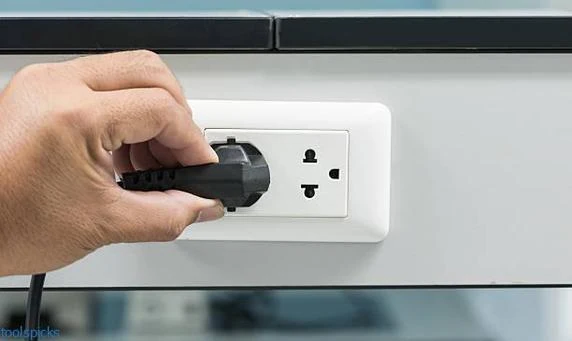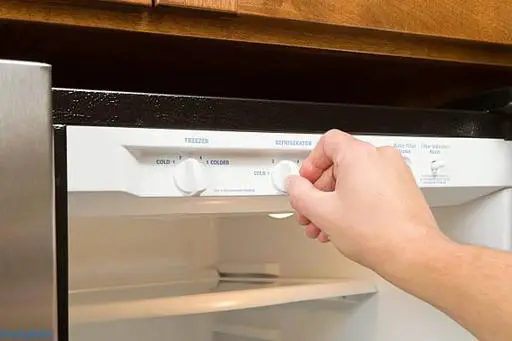It’s a question that has been asked for years: are refrigerators 110 or 220 volts? The answer is it depends. In the United States, most refrigerators are designed to run on 110 volts. However, some newer models can run on 220 volts. If you’re not sure which voltage your refrigerator needs, it’s best to consult the owner’s manual or contact the manufacturer. In this blog post, we will discuss the difference between 110 and 220-volt refrigerators and help you decide which one is right for you!
110 Volts Or 220 Volts?
Most homes in the United States are equipped with 220-volt outlets, but your refrigerator probably runs on 110 volts. The difference between the two is the amount of power that they can provide. A 220-volt outlet can provide twice as much power as a 110-volt outlet, but it doesn’t necessarily mean that your appliance will run twice as fast or be twice as powerful. In most cases, appliances are designed to run on either voltage, so you’ll need to check the voltage rating of your fridge before plugging it in.
If your fridge is rated for 220 volts, you’ll need to use a special adapter or have an electrician install a new outlet in your home. If you’re not sure which voltage your fridge is rated for, you can check the owner’s manual or contact the manufacturer. Once you know the voltage rating, you can purchase the correct adapter and plug it into your 220-volt outlet.
If you have a 110-volt fridge, you don’t need to do anything special. Just plug it into any standard 110-volt outlet in your home. Keep in mind that if your home is equipped with 220-volt outlets, they’re usually located in the kitchen or laundry room. So, if you’re plugging your fridge into an outlet in another room, you may need an extension cord.
Now that you know a little bit more about electrifcity, you can rest assured that your fridge will be properly powered no matter what voltage outlet you use. Just be sure to check the voltage rating before you plug it in!
Always Check Your Refrigerator’s Manual To Know The Exact Voltage It Requires!
If you’re ever unsure about what voltage your refrigerator needs, the best thing to do is to consult the owner’s manual. The manual will have all of the information you need to know about powering your fridge. It’s always better to be safe than sorry, so make sure you check the manual before plugging in your appliance. You can also contact the manufacturer if you can’t find the voltage rating in the manual. They should be able to tell you what voltage your fridge needs and how to properly power it.
How To Check If You Need A Special Outlet For Your Refrigerator
Your refrigerator is one of the most important appliances in your home, so it’s important to make sure it’s always in good working order. One way to tell if your fridge is running efficiently is to check the outlet it’s plugged into.
If the outlet is hot to the touch, this could be a sign that your fridge is overworking itself, and it may need a special outlet that can accommodate the extra load.
1. Check the plug of your refrigerator to see if it feels hot or warm to the touch. If it is, this means that your fridge is drawing too much power and maybe working harder than it should keep everything cool. This can cause the outlet to overheat, which in turn could lead to a fire or other issues.
2. Turn off the refrigerator and unplug it from its current outlet. If you have an electronic meter, you may want to use this to test the outlet and see if it’s getting too much power. Otherwise, you can simply call in a professional electrician to test the outlet for you.
3. If your refrigerator is drawing too much power, consider having a special outlet installed by a qualified electrician. This type of outlet is specifically designed to handle the extra load, and it will help to keep your fridge running more efficiently.
4. If you don’t want to go through the hassle of having a new outlet installed, you may be able to use a power strip with an over-current protection feature. This will help to prevent the fridge from drawing too much power, but it won’t solve the underlying issue.
As you can see, there are a few different things that you can do if your refrigerator is drawing too much power and causing your outlet to get hot. By following the tips above, you should be able to keep your fridge running smoothly and avoid any safety issues in the future.
Advantages In Using Special Outlets For Refrigerators
One of the most important features of any refrigerator is its cooling system. Unfortunately, this system can also be one of the hardest parts of the appliance to service or maintain on your own. This makes it very important to make sure that you take advantage of specialized outlets for refrigerators when purchasing new appliances, or having repairs made. These outlets will help to ensure that your fridge receives the proper amount of power to keep its cooling system functioning properly.
Another important reason to use special outlets for refrigerators is that they can help to protect your food from spoilage. If your refrigerator ever stops working, or if the power goes out for an extended period, having this type of outlet in place can help to prevent your food from going bad. This is especially important if you have perishable items like milk or eggs stored in your fridge. By having a backup power source, you can rest assured knowing that your food will be safe even if there is an interruption in service.
Finally, special outlets for refrigerators can also help to save you money on your energy bills. These outlets are specifically designed to ensure that your refrigerator receives only the amount of power it needs, which can help to save you money on your monthly utility bill. This is especially important if you have a large family or keep your fridge stocked with lots of food, as the added energy use could contribute to higher than normal bills.
Will My Refrigerator Malfunction If Plugged In Into A Wrong Voltage Outlet?
It’s always best to check the voltage rating of your fridge before plugging it into an outlet. However, if you accidentally plug it into the wrong voltage outlet, the worst that will happen is that the fridge will stop working. It won’t cause any damage to the appliance or pose a safety hazard.
If you’re ever unsure about what voltage your fridge needs, the best thing to do is to consult the owner’s manual or contact the manufacturer. They should be able to tell you what voltage your fridge needs and how to properly power it. Just be sure to double-check before you plug it in!
Conclusion
In conclusion, refrigerators usually run on 110 volts in the United States. However, some newer models can run on 220 volts. If you’re not sure which voltage your refrigerator needs, it’s best to consult the owner’s manual or contact the manufacturer. Thanks for reading!



